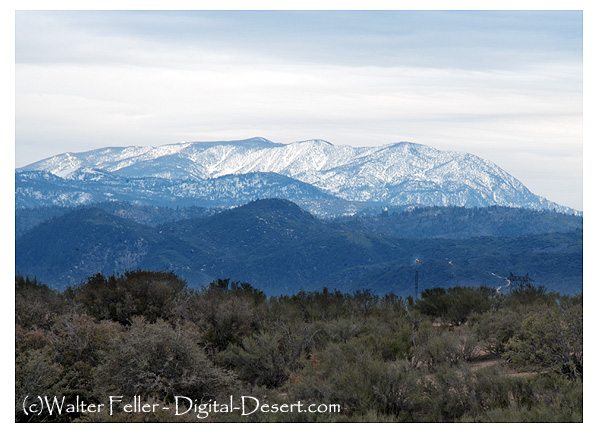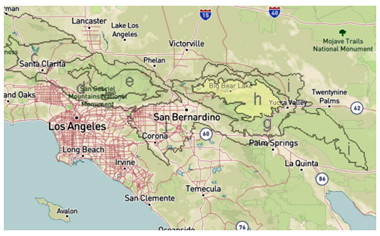Subsection M262Bh
Upper San Gorgonio Mountains

This
subsection comprises the higher elevations and cooler parts of the
San Bernardino Mountains.
The climate is temperate to cold, and subhumid.
MLRA 22d.
Lithology and Stratigraphy. This subsection contains mostly Mesozoic granitic rocks. Also, there are some Pre-Cambrian gneiss and Paleozoic marine sedimentary rocks. The mountains are a horst with faults and steep escarpments on the south-southwest, east-northeast, and west-northwest sides. Quaternary nonmarine sediments and Recent alluvium are small but important components of the subsection.
Geomorphology. This is a subsection of steep and very steep mountains with narrow to rounded summits. There is a high rolling plateau surface at about 6500 to 7500 feet with some Quaternary fluvial and lacustrine deposits on it. The subsection elevation range is from about 4000 feet up to 11,502 feet on Mount San Gorgonio. Mass wasting and fluvial erosion are the main geomorphic processes.
Soils. The soils are mostly shallow Typic Xeropsamments, Typic Xerochrepts, Pachic Xerumbrepts, and Ultic Argixerolls. Also, there are Mollic Xerofluvents on late Quaternary alluvium. The soils are leached free of carbonates. The soils are well drained. Soil temperature regimes are mostly mesic, and some frigid at higher elevations. Soil moisture regimes are xeric.
Vegetation. The predominant natural plant community is Ponderosa pine series. There are small areas of Coulter pine series, Mixed chaparral shrublands, Jeffrey pine series on the north side of the mountains, and small areas of Limber pine series. Lodgepole pine series is common at higher elevations.
- Characteristic series by lifeform include:
Grasslands: Alpine habitat, Beaked sedge series, Bur-reed series, Creeping ryegrass series, Shorthair sedge series, Sedge series, Tufted hairgrass series.
Shrublands: Big sagebrush series, Black sagebrush series, Bush chinquapin series, Deerbrush series, Eastwood manzanita series, Greenleaf manzanita series, Interior live oak - chaparral whitethorn series, Interior live oak - canyon live oak shrub series, Interior live oak - scrub oak shrub series, Mixed saltbush series, Mixed scrub oak series, Mountain whitethorn series, Rothrock sagebrush series, Rubber rabbitbrush series, Scrub oak series, Scrub oak - chamise series.
Forests and woodlands: Aspen series, Bigcone Douglas-fir series, Bigcone Douglas-fir - canyon live oak series, Black cottonwood series, Black oak series, Canyon live oak series, Coulter pine - canyon live oak series, Curlleaf mountain-mahogany series, Incense-cedar series, Jeffrey pine series, Jeffrey pine - Ponderosa pine series, Limber pine series, Lodgepole pine series, Mixed conifer series, Mixed subalpine forest series, Mountain juniper series, Singleleaf pinyon series, White fir series.
Surface Water. Runoff is rapid. All but the larger streams are dry through the summer. There have been natural lakes on the high plateau recently, but any lakes that persisted until historical time have been replaced by reservoirs.
< previous - Southern California Mountains and Valleys - next >